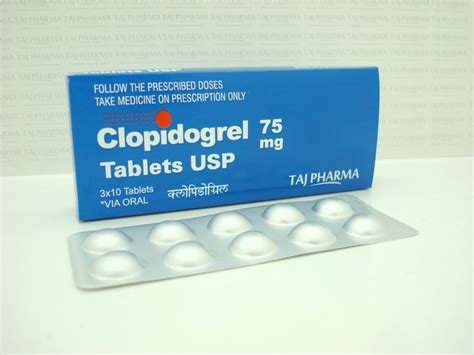Clopidogrel Tab 75Mg Uses: Blood Thinner Guide

Clopidogrel, commonly known by its brand name Plavix, is a medication that has been widely used for its blood-thinning properties. It belongs to a class of drugs known as antiplatelet agents, which work by preventing platelets in the blood from clumping and forming clots. The 75mg tablet is a standard dosage of clopidogrel, prescribed for various conditions to reduce the risk of heart disease and stroke. In this comprehensive guide, we will delve into the uses of clopidogrel 75mg tablets, their mechanism of action, potential side effects, and the importance of this medication in managing cardiovascular health.
Mechanism of Action
Clopidogrel works by inhibiting the activation of platelets via the P2Y12 receptor, a key component in platelet activation and aggregation. When a platelet is activated, it releases chemicals that attract other platelets, leading to the formation of a platelet plug. This process is crucial for stopping bleeding when a vessel is injured. However, in the context of cardiovascular disease, excessive platelet aggregation can lead to the formation of harmful blood clots that can cause heart attacks and strokes. By blocking the P2Y12 receptor, clopidogrel reduces the likelihood of these adverse clot formations, thereby reducing the risk of cardiovascular events.
Uses
Clopidogrel 75mg tablets are prescribed for several conditions related to blood clotting and cardiovascular health:
Acute Coronary Syndrome (ACS): This condition occurs when the blood flow to the heart is suddenly blocked. Clopidogrel is used along with aspirin to prevent further clotting.
Recent Myocardial Infarction (MI): For patients who have had a heart attack, clopidogrel is used to prevent another heart attack.
Recent Stroke: Patients who have had a stroke due to blood clots are prescribed clopidogrel to prevent future strokes.
Peripheral Artery Disease (PAD): PAD occurs when the arteries that supply blood to the limbs are narrowed or blocked. Clopidogrel is used to reduce the risk of heart attack and stroke in patients with PAD.
Stent Placement: After the placement of a coronary stent, clopidogrel is often prescribed to prevent the stent from becoming blocked by blood clots.
Side Effects and Considerations
While clopidogrel is effective in preventing blood clots, it can also increase the risk of bleeding. Common side effects include:
- Bleeding: The most significant risk of clopidogrel is its effect on bleeding. Patients may experience bruising, bleeding gums, or nosebleeds more easily than normal.
- Stomach Pain or Upset: Some patients may experience stomach discomfort or nausea.
- Diarrhea: This is another common gastrointestinal side effect.
- Tiredness: Feeling weak or tired is reported by some patients.
It’s essential for patients to discuss all medications and health conditions with their doctor before starting clopidogrel, especially any history of bleeding disorders, stomach ulcers, or liver disease. Clopidogrel should be taken exactly as prescribed by the healthcare provider, and patients should not stop taking it without consulting their doctor, as this can increase the risk of a heart attack or stroke.
Interactions with Other Medications
Clopidogrel can interact with a variety of medications, increasing the risk of bleeding or reducing its effectiveness. Patients should be particularly cautious with:
- Aspirin: While often prescribed together for cardiovascular health, the combination can increase the risk of bleeding.
- Warfarin: Another blood thinner that can increase the risk of bleeding when combined with clopidogrel.
- Nonsteroidal Anti-Inflammatory Drugs (NSAIDs): Medications like ibuprofen or naproxen can increase the risk of stomach bleeding.
- Selective Serotonin Reuptake Inhibitors (SSRIs): Certain antidepressants can increase the risk of bleeding when taken with clopidogrel.
Lifestyle Considerations
While clopidogrel is an effective medication for preventing blood clots, lifestyle changes can also significantly impact cardiovascular health. Patients are often advised to:
- Maintain a Healthy Weight: Excess weight can increase the risk of heart disease.
- Exercise Regularly: Physical activity can help lower blood pressure and improve overall heart health.
- Eat a Balanced Diet: Focus on foods low in fat, salt, and cholesterol, and high in fruits, vegetables, and whole grains.
- Manage Stress: High stress levels can increase blood pressure and heart rate.
Conclusion
Clopidogrel 75mg tablets are a crucial medication for individuals at risk of blood clots and subsequent cardiovascular events. By understanding how clopidogrel works, its uses, potential side effects, and the importance of adherence to prescribed treatment, patients can better manage their cardiovascular health. It’s also vital to maintain open communication with healthcare providers about any concerns or questions regarding clopidogrel or any other medication. Through a combination of medication and lifestyle adjustments, individuals can significantly reduce their risk of heart attack and stroke, leading to a healthier and more fulfilling life.
FAQ Section
What is the primary use of clopidogrel 75mg tablets?
+Clopidogrel 75mg tablets are primarily used to prevent blood clots in patients at risk of heart attack or stroke, particularly those who have had recent myocardial infarction, stroke, or have peripheral artery disease.
Can clopidogrel be used with other blood thinners?
+Clopidogrel can be used with other blood thinners like aspirin, but the combination should be closely monitored by a healthcare provider due to an increased risk of bleeding. Other medications like warfarin should be used with caution and under strict medical supervision.
How long does it take for clopidogrel to start working?
+Clopidogrel begins to take effect within a few hours of taking the first dose, but it may take several days to achieve its full effect. It’s crucial to take clopidogrel exactly as prescribed by the healthcare provider and not to stop taking it without medical advice.
What are the symptoms of a serious side effect of clopidogrel?
+Serious side effects may include signs of bleeding such as bloody stools, vomiting blood, or severe headache. Additionally, symptoms of an allergic reaction like rash, itching, swelling, or difficulty breathing require immediate medical attention.
Can clopidogrel be used in patients with liver disease?
+Clopidogrel should be used with caution in patients with liver disease. The medication is metabolized in the liver, and liver disease can affect its metabolism, potentially leading to increased levels of the drug in the body and a higher risk of bleeding. Patients with liver disease should be closely monitored by their healthcare provider.



